Building Trust In Your Contracting Business
If people like you they'll listen to you, but if they trust you they'll do business with you.
Zig Ziglar
What’s the first thing that pops into your mind when you think of trust in your contracting business?
Reviews? Perhaps you’ve heard some marketing gurus tell you how important Know, Like & Trust, is in your business…
Although there may be some truth behind it, that doesn’t even scratch the surface.
This article is here to give you the complete picture of what trust can do for you, your team, your business, and life. And how to tap into it.
To create a complete resource, I’ve studied several published studies (download studies). Read a few books on the topic from thought leaders like Stephen Covey, his son, and Greg Link. Interpreted hundreds of reviews. Interpreted dozens of articles from reputable sources like Harvard Business Review, Forbes, Better Business Bureau, Entrepreneur, etc.
How does trust tie into business, leadership, and life.
After tying in my own expertise and put on my “contractor lens” to see how it works specifically for contractors… I came up with a resource that’s pretty darn incredible, useful, & applicable.
Let’s dive in.
Why Build Trust & The ROI Of It
In the book Cashvertising by Eric Whitman, there’s a super powerful question on how to transform features into benefits in your marketing.
The question is: “What’s in it for me?”
So if you were to say:
“Our team works super fast!”
…imagine your customer looking at you with contempt and asking: “So what’s in it for me?”
Now you can rephrase and say:
Mrs. Jackson,
By having the job completed in a week, you won’t even feel our presence.
You’ll be back to enjoying your home with your loved ones in no time at all.
You’ll be able to see how things develop from day to day and there will always be someone on the job to keep in touch with you in case you have any concerns.
If you’re to ask me the same question, referencing the subject of trust in business, I’d say…
Once you learn about trust and apply it in your business, you’ll be able to:
- Decrease acquisition costs and speed up your jobs, enabling you to make more money
- Tap into more energy and have more joy - so instead of business sucking the life out of you, you’ll be able to enjoy more quality both at work and at home
- Attract more qualified people to work for you, so you can build a team that doesn’t need your hand holding
- Create a collaborative environment for them for all to thrive in, decreasing the rate at which people leave and being able to have consistency in your business
- Gain trust back in case you lose it, so instead of losing a customer for good and turning them against you, you’ll earn their continued business and their referrals
- Nurture trust so you create dependable long-term growth in your business & life
How’s that for a few good reasons and an ROI (Return On Investment)?
The world is increasingly interdependent. And since the internet, the gap between connections grows shorter every day. People want to be led, inspired, trusted.
Nowadays, managers that still live by the old model of “command & control” instead of leading with trust are becoming extinct. Nobody wants to work for someone that puts them down and threatens their job security daily.
It’s like using a screwdriver to drive in a nail. The tool is not suited for the situation.
Think about your interaction on a job with someone you trust. Communication is smooth, you get along. The job is a pleasure to complete. You know you’ll get it done on time.
Now think of a situation where you had no trust in your employee, sub, or partner.
Trust changes everything.
4 Myths On Trust That Don't Serve You
There’s a consistent list of beliefs that shape our current reality.
A fantastic feat we have as humans is that we can rewrite or rewire our beliefs to create a reality that serves us better.
Let’s explore 4 myths about trust that don’t serve you.
Myth #1: People assume that you either have it or don't
Great news.
Trust is a learnable skill. You can learn trust, and you can grow trust.
That’s exactly the scope of this article. To widen your horizon on the new opportunities you can create for your business and life.
Learn what makes up 80% of trust, so you can leverage this new-found skill.
Like any skill, you’ll need to practice it regularly to get better at it.
Myth #2: We have no control over trust or it’s outside of our control
Have you ever considered what makes a person trustworthy?
It’s the interactions they have with the outside. For example, if someone does what they said they were going to do – they gain your trust.
But they took action. They did something to gain your trust.
Or they have your trust, to begin with, and then they do something and they “break” your trust.
In both scenarios, to both win or lose the trust you need to perform an action.
The minute you think the problem is somewhere out there is the moment you won’t do anything about it. And like any system, that doesn’t have new inputs will most likely degrade over time.
Trust starts with you.
In many languages around the world (including Spanish), trust is interchangeable with the word confidence.
When you have integrity and have confidence in yourself it’s easier for you to take the risk of extending trust to others.
In Japan, there’s a list of the top 100 trusted companies. After intensive research, it was found that the companies on that trust list were 283% more profitable than any other company that wasn’t on the list.
In 1958 when Toyota started selling cars in the US market they were able to sell only 288 cars.
As more Americans discovered the quality and reliability of Toyota products, sales continued to soar. By July 1967, Toyota had become the third-best-selling import brand in the United States.
Toyota Pressroom

In 2019, out of the top 5 car manufacturers, 3 are Japanese based. They overtook the US market and they didn’t do it with force, they didn’t do it through buy-outs or mob-like actions.
They took care of their customers and earned their trust. They built trust.
Trust starts with ourselves.
It’s the same as everything else in life …
In case you want to change other people, for example like I always wanted to change my wife – there’s always a constant tension.
But when I looked inside and started developing empathy, I tried to understand how she really feels, put myself in her shoes… I understood her struggles. Instead of trying to change her, I started taking little steps in changing myself.
I started my personal development journey. It started by reading a book… Then I bought my first course. I implemented parts of it and it was uncomfortable as hell.
In a few years since starting, the situation looks completely different.
I can wholeheartedly say that our relationship is many times better than when we started on our journey together.
If you think it’s… the economy, your customers, your banker… take a look in the mirror and ask yourself if that’s true.
You want to be smart about it.
Myth #3: Once it’s lost, you can never get it back
Can you think of a situation when someone “broke” your trust? But after they did a set of actions, they were able to “win” your trust back?
Although much more difficult to gain trust back once lost, there are ways to get trust back. Usually by changing behavior related to that trust element. But we’ll get back to that later.
You have a great opportunity to dispel this myth.
While other contracting companies will usually move on from customers they’ve wronged… and usually suffer the downsides of having angry customers leaving negative reviews and bad-mouthing them…
You can earn back the trust of the customers you’ve wronged.
For example, Ritz-Carlton empowers its lowest-paid people to do a recovery of up to $2000 – on the spot. If it’s either a free dessert, a complimentary meal, having that rare steak redone, or whatever it is.
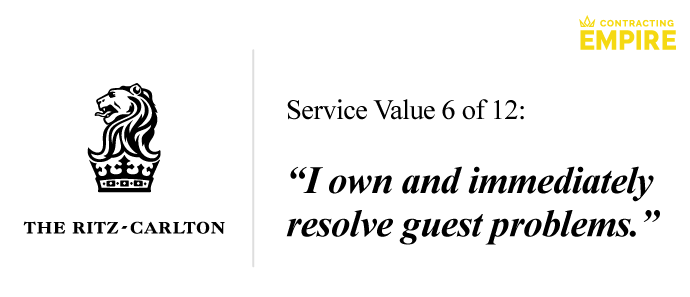
They understand that getting the customers’ trust back right there and then is the most cost-effective solution for their business. If the issue would escalate to top management they could end up losing a lot more money.
You could scoff it off and say that a high-end luxury hotel chain can afford it. But even as a contracting company there are things you can do to earn trust back and make an impression.
The first way to get trust back is to actually do a temp check and see where you stand in relation to your customer.
Sometimes people don’t share their pains and everybody ends up frustrated after a job.
I’ve come across hundreds of reviews where customers complain about contractors not cleaning up after the job.
It’s not that difficult to learn from your mistakes. But you need to take the time after each job to speak to the beneficiary and ask for their feedback.
Sometimes you can regain your customers’ trust by gracefully admitting to any shortcomings on your end. Explaining why it happened, in a way that’s simple to understand.
There are some cases where you may over-commit on a job. Or because of circumstances that are outside of your control, you end up breaking a promise or commitment. In this case, you can lead with recovery before things get out of hand and it’s too late.
The essence of recovery is timeliness. You have to inform the customer quickly of the uncomfortable news. Apologize for not being able to fulfill your commitment and then make a new promise to make it up to them.
This usually works only one or two times before trust is completely lost. So make sure you make things right on the second go.
Myth #4: You can’t measure trust
Although trust is something elusive to pin-point, FranklinCovey created The Trust Index Model to tackle this. It consists of the “4 Cores of Credibility” and “13 Behaviours of High-Trust”. It met all the criteria to be accepted as a robust, scientific Structural Equation Model.
So not only can you measure trust, but you can also take action to improve it.
Let’s break the models down below.
The 4 Cores of Credibility
The Speed of Trust was the #1 recommended book in 2018 by the top CEOs in the US. And for all the right reasons.

In it, Stephen M.R Covey does a great job breaking down trust in two key components: character and competence.
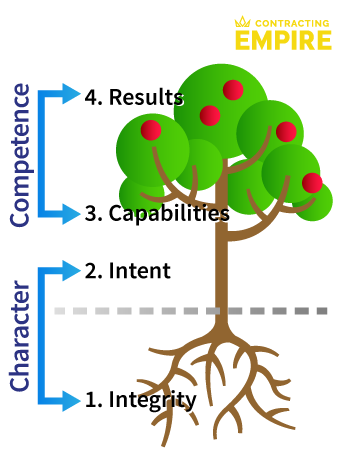
To visualize trust, you can think of it as a tree. Character is the part that only you see, the roots of the tree. This is the foundation of trust. Just like the roots of the tree, the world doesn’t see much of it, but it’s crucial for the tree’s survival.
Character is composed of integrity and intent.
The branches & fruits of the tree represent competence. This is the part that the outside world sees.
Competence is made up by capabilities and results.
Character
You may not be able to control everything, but you can influence certain things. Trust starts with you.
Stephen M. R. Covey
The roots of your character are ingrained in the integrity you have and the intent with which you do things.
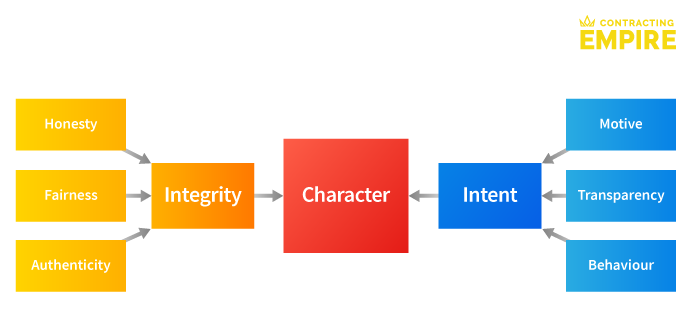
Breaking down integrity as a contractor
Your clients increase their trust in you and your team when you do what you say you’re going to do. When you meet your set deadlines.
When you are fair on your estimates people will respect you even more for it. There’s a big difference between price and value. While price holds no intrinsic value on its own and doesn’t reflect much… value is the perception customers have about you and your service.
Your goal should always be to increase the perceived value of what you have to offer. I’ve seen a handful of contractors that get this. For example, they are much more expensive than other contractors, BUT the customers always come out happy from the interaction.
These are contractors that aren’t cheap because they have well-paid teams. They use the highest quality materials. Their profit margins are healthy enough to create a thriving business.
Profit margins are not obtained by overcharging by 50% on the price of materials. The profit margins are a direct reflection of the quality of work that you do.
How well you handle questions, complaints, and communication. How you and your team show up on the job. If you start the job when you said you will and more.
You can’t lie with the same intensity that you can tell the truth.
Greg Link
Being honest is the shortcut to a happy life. If you ever lied, you’re well aware of how complicated things can become – quickly.
It’s way more valuable to let the customer know if an uncalculated-for problem occurs. Explain what happened, take responsibility, and promise to take care of it.
Authenticity is more than you being yourself. I always love when people compliment me on my authenticity because I know what it means. Or I find it funny when people tell me that another leader is “authentic”.
If your authentic self is to be a goof-ball, that wouldn’t be perceived as a plus.
People tend to confuse authenticity with emotional intelligence. They confuse authenticity with competency and skill.
I was talking to my wife the other day about Paul Martinelli. This dude was a high school dropout. He was ridiculed for stuttering and often referred to as ‘dummy’ before he abandoned school to become a nighttime janitor. He is now the president of the John Maxwell Company. His net worth is a cool 9 figures.
If you look at him and his videos today, you’d say he’s the most authentic person. But people fail to realize the amount of work he put into his image. To actually create this “authentic” version.
Reframing intent in the contracting space
When you’re on a job site for an estimate and you get down to negotiations… it’s easy to get your guard up about the information you share.
You may be thinking that the customer may use that information and share it with another contractor that works cheaper.
At the same time, the customer may ask themselves: “Where’s Joe going with this? Where is this leading? What’s the next thing? What’s their actual intent? What’s their motive behind saying that?”
As a result, negotiations usually lack the trust element. The client focuses on price instead of the value and you as the contractor get frustrated by all the lowballing.
The solution?
Be transparent from the start. Layout your intention up-front.
“Here’s what I’d love to accomplish on your project.”
“Here’s what I hope to convince you in our interaction today.”
This will open your customers up so they can really listen to what you have to say. They’ll be able to ask you better questions.
They already know where you’re going with the conversation so they can focus now on stacking perceived value about you and what you’re saying.
And the funny thing about trust is that it’s reciprocal.
When you open up to them – the more they’ll open up.
Less strategy, less scarcity, less fear of commitment. They’ll become more abundant and more open in the conversation.
Win-win.
Competence
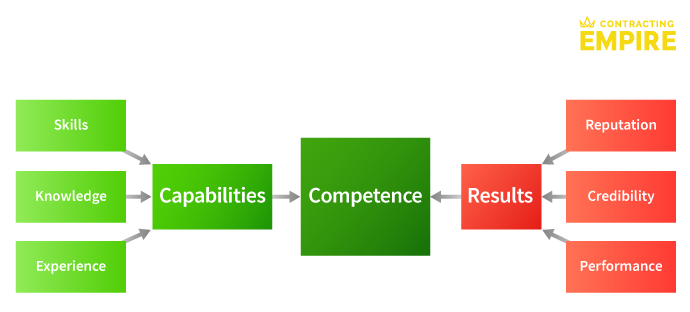
One of the first things that clients do when searching for a contractor is to see how good they are at what they do.
When you go fishing, you don’t use 50 different lures at the same time. You adapt your lure to the specific fish you’re looking to catch.
But in the contracting space, it’s not an unusual occurrence to see contractors offer 10+ services hoping that a “fish” might bite on one.
If you want to win, cut down that service offering to 5 the most. People need to see that you’re good at what you do. And specialists will always earn more than generalists.
Think about it. A neurosurgeon earns about $700k/year. A general doctor will struggle to make $150k for the same year.
And when you look for a neurosurgeon… which one will you choose? The most recommended one, right?
In your contracting business, you need to specialize in something. And have or create a great track record.
Clients are always on the lookout for the most relevant contractor. One that’s up to speed with the latest tools and tech. One that’s credible and has a track record of performance.
Your results are observable.
We trust people who produce good results. You trust companies, brands that do what they say they’re going to do. This is what builds up your reputation.
Trust in your contracting business, the inside look
You can’t collaborate with people you don’t trust.
You can coordinate with them, perhaps you may even get their cooperation, but that isn’t collaboration. Collaboration requires high trust. You have to be able to reach out.
A lot of people say they are collaborative in their contracting business, but they just coordinate. They do not know how to collaborate.
If you can’t be a trusted person in a low trust world you’re going to be left behind.
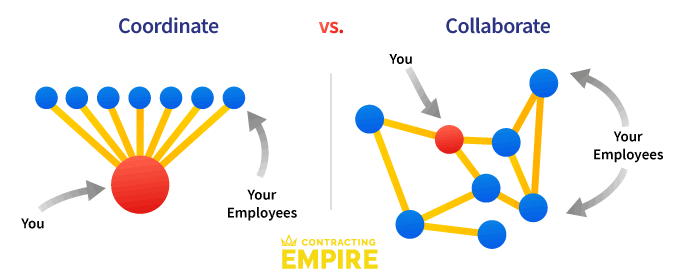
When trust is low, people & relationships become combative. We all have differences, but in the set of low trust, these differences become divisive. That’s when people leave.
When trust is high in your business, things become synergistic.
There are two key components to growing a contracting business:
- Getting good people
- Keeping them
Each time you lose a valuable employee, there’s an opportunity cost involved. You’ll have to go through the process of finding a new person, then train them. Basically, start from scratch. Extend trust to them and give them a medium where they’re able to grow and gain experience and expertise.
If you find someone that is valuable, make sure they know that. Empower them to make decisions. Show up as a leader and enable them to lead as well.
SAS is a high trust company that attracts over 156,000 people to apply to their job openings every year. They’re able to save $70 million every year because of the loyalty that people have towards the company.
When you’re confident in yourself it’s much easier for you to take the risk of extending trust to your team members.
It may look scary in the beginning until you develop a reputation for your business. You build that brand trust.
Once you set up a reputation for trust, people are attracted to you like bees to honey.
Showing up as a leader in your contracting business
The moment there is suspicion about a person’s motives, everything he does becomes tainted.
Mahatma Gandhi
Trust is the #1 competency of leadership needed today. At the same time, we need to recognize that building trust takes hard work, consistency, and time.
Covey identified 13 behaviors that have a direct impact on building or destroying trust.
Character-Based Behaviors
- Talk Straight
- Demonstrate Respect
- Create Transparency
- Right Wrongs
- Show Loyalty
Competence-Based Behaviors
- Deliver Results
- Get Better
- Confront Reality
- Clarify Expectations
- Practice Accountability
Character & Competence Behaviors
- Listen First
- Keep Commitments
- Extend Trust
Although the names are pretty self-explanatory, you can read more about the 13 behaviors of high trust here.
I’d like to focus more on how to normalize these, make them part of your daily life.
To be able to do that we need to understand the disconnect in the way we perceive ourselves.
By looking at the data of 52,692 respondents that took the Speed of Trust Index questionnaire (sample here, other reports here)… the conclusion is pretty simple.
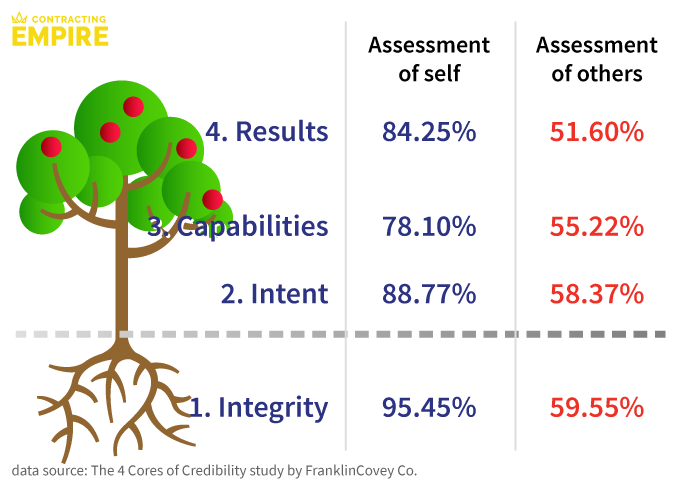
We believe that we are more trustworthy than others think we are. At the same time we rate others much lower. For example, while 95.45% of respondents considered that they have integrity, the reality of all the ratings was 59.55%.
So there’s a huge gap between what we consider ourselves to be vs. what others think of us.
| How I rated myself: | 93.21% |
| How I rated everyone else: | 62.99% |
93.21% of people consider themselves trustworthy while rating others only 62.99%.
Their sample size is quite significant to say that in reality, people have moderate trust in each other.
Another thing that is worthy to look at is the 4 worst performing behaviors of high trust. While our perception is high that we listen, we do right when we’ve wronged someone, in reality, that gap is much higher.
| Behaviour of high trust | Self-perception | Reality |
| Listen First | 86.5% | 58.1% |
| Right Wrongs | 95.8% | 58.1% |
| Confront Reality | 86.6% | 58.4% |
| Create Transparency | 96.1% | 58.6% |
It’s unlikely that you’re clear of this disconnect too. I know I wasn’t.
Model the behavior you seek in others
Taking some time to go over each behavior for yourself and being truthful with yourself is a great first step to become an amazing leader. One that you deserve to be, one that your employees deserve, one that the world deserves.
Once you realize the areas you can improve on, take the one you consider most important and work on it. You’ll be amazed at how quickly people that surround you will notice.
So if you want your employees to listen to what you have to say, listen first. Hear them out. Fully and without interruption. Even if you don’t like it, even if you think they’re wrong.
Let’s see how you can inject trust into the interactions you have with customers.
How to gain customer trust in your business?
If you ever wondered “How can I get customers to trust me?”, I’ll share my findings after going through hundreds of contractor reviews.
I’ll sprinkle in some bullet points at each stage. You should read these thoroughly as they’re exactly what customers wanted.
Let’s break down the trust-builders based on the stage of the job.
1. Creating trust before receiving a quote request or sending an estimate
One of the things I hear contractors complain a lot is that customers are always haggling for the lowest price. This is a positioning and trust issue.
You also need to be aware that your potential customer may already have a pre-set thinking based on past experience with other contractors. Here’s one for quick reference: “my experience […] is they often are in a rush to finish the job which sometimes increases the possibility of compromised quality and less than ideal decisions”.
Another customer states “If you ever hire people to work on your home, you know there will be delays, excuses, mistakes and lots of frustration”.
And last but not least, actions speak louder than words: “One other contractor that was a lot cheaper kept ignoring me and not replying to my emails and text or would take days to reply”.
This is what you can use in your language over the phone/email.
Mrs. Jones,
Although our price may seem higher than our competitors we don’t rush jobs and we don’t compromise on quality.
We stand by our craftsmanship. The decisions we’ll make together will ensure that we complete the job at the highest standards.
Our goal is to remove all frustration from the process. Unlike other contractors, we don’t make excuses and we’re quick to fix any mistake that may arise.
You can call me anytime with any concerns you may have and you’ll be sure that I’ll pick up or call back ASAP!
I can see that price objection just fading away into nothingness.
Here are a few more things that customers value more than price:
- Quality is a priority over price in most cases
- They want the contractor to be reliable, respectful, and professional
- To most, having piece of mind is priceless
- If the contractor promises them something, it's important that it gets delivered as specified, as much as is possible
- They value an owner that is friendly and accommodating
- They love it when a contractor takes pride in what they are doing - it shows that they care about the business & the customer
- Reliability helps make decisions easier - the faster you respond, the better
- Getting a prompt and detailed reply to help the customer understand what he’s facing and empower him to choose the best option
- Make sure you stand behind your work
And a few more things that build trust before getting on the call:
- They value if your company is licensed and in good standing
- You should have liability insurance - one that covers any injury (to customer & employees) or property damage
- If you have overwhelmingly positive reviews online, it helps a bunch
- It’s great if other people (past clients, family members etc.) can provide them with raving reviews
- Showcasing awards and certifications is a plus
- Running your company ethically
- Make sure that you let it show that you’re easy and fun to work with. Nobody likes a grouch / stressed contractor
2. Building trust during the quote & estimate phase
The recurring theme during this phase, stated by 80% of homeowners is the speed at which you call or reply after a quote request. Any interaction that takes place in less than 30 minutes from a quote request makes a huge difference.
Make it your goal to be the first to respond.
Responding faster to quote requests not only makes a great impression and sets the stage of how responsive you are, but it will also beat any other contractor that will be bidding on the same job.
What you should do during the conversation is to ask a lot of questions. Be detail-oriented. Be genuinely curious about the solution this customer is looking for. Take your time in getting to know them.
By listening intently to what they need done, not only will the customer feel that you listened to them… you’ll also be able to get a more clear picture of what needs to happen.
When you meet up in person make sure you bring your friendly face and smile along for the estimate. Be personable and professional about the work that you do.
You should take the time to explain solutions based on your expertise. For example, if you’re a painter you could warn them if they want to go with a sprayer because it may cause headaches with their ceiling fans and that brand new carpet.
You’re their trusted advisor.
Talk about the materials that you use. Explain why your delivery times are higher or lower. Perhaps your prep work is superior and takes a bit more time. As a rule of thumb, it’s always better to underpromise and overdeliver than the other way around.
If they don’t need a job done right now, don’t upsell it. If they only need one roof shingle replaced, don’t upsell the whole roof. You could suggest that in 10 years they may need to replace it, but if it’s not needed at the current point, tell them so. While all other contractors will be greedy, you’ll come across as the genuine guy that cares.
Be honest. Both in how you present yourself as well as your evaluation.
Giving them some extra tips won’t cost you anything. If you’re already giving an estimate and are on location… Does it really matter if you spend another 5 minutes to offer excellent service?
It definitely does, because if you don’t – you’ll have wasted much more time driving to the location in the first place. So why not overdeliver?
And while you’re at it, take measurements, take pictures, take note of everything you need to take note of. Make sure you have everything you need for your proposal before driving away.
You’re a professional.
Make sure that it shows that you take great pride in your craft and customer service. Be humble. Be sincere if there are any foreseen issues and discuss them before starting the job.
If you’re booked up 3 months ahead, tell them. Instead of overlapping jobs, there’s a high chance they’ll be fine with it if they like you and they’re not in a rush.
Be transparent about your workload and make sure you can start when you say you will.
To increase the trust you can also add a warranty to your job. Warranty that pertains to your craftsmanship. A warranty or guarantee could assure a reluctant customer that everything’s going to be alright.
There are some contractors that offer a “lifetime warranty”. Don’t. It can be misunderstood and nothing lasts forever. There’s no added value in making such a claim and you’re opening up a can of worms.
If you do this right, they won’t even care about the other contractors that they may have considered.
3. Increasing your chances to land a job during the proposal / laying down scope of work
- Your proposal is professional and detailed
- The estimate includes every detail of work that’s going to be completed
- Be accommodating of their schedule and requests, if possible
- Answer any questions they may have
- Be patient and don’t rush or make them feel rushed.
Nobody likes to be surprised by hidden bills at the end of a job. So even if some things are more expensive or need to be included in the proposal, make sure you add them upfront.
If it makes you feel better, add a 3% budget for unforeseen expenses. Perhaps little jobs that you can do while you’re at. That way you won’t feel frustrated that you’re doing extra work for nothing.
Speaking of which, let’s get down to the job itself.
4. Keeping and increasing trust during a job
It goes without saying, but I must after going through all those reviews, be a man of your word. Make sure you show up on the job on the date and hour that you set.
Before starting a job, make sure that your prep work is superior.
There will be times when things out of the customer’s control will throw you a curveball. This may include the Homeowners Association denying selections you make to finishes or materials. Sometimes you’ll be thrown a curveball and materials may not be available.
As a rule of thumb, make sure you’re in constant contact with your customer and she’s always in the loop. Let them know at all times what is happening on the job.
Sometimes there will be some odd curveballs. Perhaps some touch-ups are needed. Take care of them – no questioning, no back and forth. Be professional about it. Like I mentioned above, your quote should encompass a “headache” cost.
You’ll get much more out of your relationship with the customer by doing a quick job than haggling and negotiating a $10 fix of sorts.
Also, try not to mess up the customers’ property.
I’ve seen some horror stories where the sub forgot to put the car into park and it destroyed the lawn. Another one took the dirt from the freshly dug pool hole and spread it neatly over the grass… Another sub spilled a bucket of paint and then during clean-up spread it all over the porch and garden making an even bigger mess… Another sub came around to change the pool pump while the owners were away – that’s called trespassing.
Man, you’d be shocked.
In case something does go wrong, take ownership of the mistake. Discuss with the customer before you do anything about how you can make it right by them.
Use sentences like:
“Unfortunately this happens sometimes. I’m sorry it has happened to you…”
“I’d be happy to clean up this mess.”
As bonus points, make sure you’re mindful of kids & pets if they have any. The quickest way to a person’s heart is through the people they care about the most. I’m not saying you should be a creep about it… but you could extend an invitation to a kid for example if he wants to mix some materials or any small task that won’t get him hurt.
Everybody wants to feel that they belong, they’re noticed and they matter.
Little things like that will mean the world to your client.
If possible, check-in during the job.
The quickest way to combat a complaint is before it grows. So make sure they share any concerns they may have during the job and make it right.
All in all, make sure you keep the promises you made during the proposal and you should have a thrilled customer.
5. How your team can make or break the customers trust
Your team is a direct reflection of you and your business. The way that you lead will perspire throughout your organization. The people you attract will be a direct reflection of the trust you extend to them. How much ownership you give them.
Customers appreciate a crew that is:
- Considerate
- Respectful
- Courteous
- Punctual
- Friendly
- Hard-working
- Skilled at what they do
- Treats each other respectfully
A team of professionals.
Build a team that your customers enjoy talking to. Make sure that at least one team member can communicate with the customer and knows the language well.
Customers can sense if your team is a cohesive group. They can pick this up from their conversations, their laughter, the way they conduct themselves.
Make sure that your employees don’t express opinions about an issue or discuss problems. Especially if there’s a possibility of the owner over-hearing them.
This can break trust immediately.
It’s very hard for customers to feel reassured that everything is right when they “overheard” your team talking that the product or service is sub-par.
Your team should never bad-mouth the customer, even if they’re right.
6. Completing the job with abundance
What customers appreciate the most is when you over-deliver on a job. Mostly timewise. When you complete it quicker than expected.
So if you know that you can do a rush job in 1 day, finish it right in 2 days… make sure you estimate 4 days. That way you leave a buffer for anything that may go wrong as well as create the opportunity to over-deliver on that timeline.
The second thing that’s most appreciated is leaving a clean job site. If you can’t do it, make sure to have a cleaning company/sub ready to get to work after you’re done. Sure, it will cost you a little extra – but the impression you’ll leave is priceless.
If there are some little extras or touch-ups to do, take care of them without fussing about it. Sometimes it’s the little details that make all the difference.
If by accident something gets damaged, fix it. For example in one of the 5-star reviews, a customer said: “One of the windows got cracked but he went out of his way to fix it with even better glass than the original.”. What did it cost the contractor? $50? On a $15k job.
Always think from a place of plenty.
You may lose $50 on this job, but the referral the customer sends you gives you the potential to make an extra $15k. I’ll let you decide if it’s worth the investment to create a great experience for your customers.
When you finish the job, make sure that you go over and make sure that the customer is happy with the outcome.
Do a final inspection with the customer.
Notice if he missed anything or something catches your eye. Point it out and fix it.
This creates such a high level of trust that the customer won’t shut up to his friends and family about the great job you did. About the amount of care, you had on the job.
You can also download this quick checklist of trust-building steps that you can print off and check as you go through a job.
Now let’s get on to my favorite part, my specialty…
Trust in your online business
A prerequisite to having trust in your online business is first to be online.
We’ve studied over 10,112 contracting websites, and 70.4% have less than 20 monthly visitors. So even if most contracting businesses are “online”, it’s like they don’t even exist.
Some of the websites we’ve seen look and behave like they were built in 2008. And they haven’t been maintained ever since. Others have been built recently but they were built for looks, not function. Some are so confusing that sometimes I wonder what was going on in the web devs mind.
There’s a huge chance that you already have a website. But your business isn’t generating any trust or customers through its online existence.
Let’s dig into 3 ways you can build trust online.
#1. Make your website part of your business, not an after-thought
A website should serve the extended function of your business. As I wrote in the article on systems thinking for contractors, the function is to create happy customers.
The best part about this salesman though is that it’s active 24/7. It never sleeps. It never takes a day off. And it builds trust for you. By the time you get on that call, the prospect is already qualified and ready to move forward.
How’s that for a time saver?
Both offline and online, the first impression sets the tone of how things move along in that business relationship. How much rapport and trust you were able to inject on that first interaction.
According to research done at the Missouri University of Science and Technology, it takes 2.6 seconds for visitors to form an opinion of your brand. And first-time visitors usually make up 70% of your site’s visitors.
Once those visitors leave, they’re less likely to return. So it’s important to give your visitors exactly what they’re looking for.
For that, your site should:
- Load fast so it doesn’t give the visitor a chance to switch tabs
- Have a clear visual hierarchy so it’s obvious for the visitor what she needs to do next
- Look clean, simple & professional
- Be mobile-friendly as 50% of all online traffic comes from mobile devices
#2. Knowledge, skill and expertise begets trust
Offline, you’ve always trusted the person that delivered important information. A teacher, a news anchor, a doctor, or even a mentor. You usually listen because they’re experts and you trust them.
That’s exactly what you can do with your website. You can educate your customers. You can answer the questions and objections they may have. Provide them with valuable content.
And that’s where inbound marketing comes into play and its most well-known component, SEO. You can read more on how to do it right in this in-depth SEO for contractors guide.
How likely do you think a prospect is to move forward with you after they read 10 articles on your site about the topic that interests them?
Yes, it does take time and effort to write that content. But just as you train a salesperson, you can use a monthly budget to train your online salesperson.
If you don’t want to do it yourself, at least you can delegate it.
We have a unique process in place where we take your voice and use our expertise, we transpose it into valuable content on your website to create a genuine customer experience. Check out our SEO service for contractors page for more on that.
#3. Visitors actively seek out social proof
Humans are social creatures. Our word was our bond not that long ago.
If someone said that you were a liar 100 years ago, you could challenge them to a duel to clear your name.
Nowadays you’d be reluctant to duel it out to protect your word, but people still trust what other people have to say about you.
And online reviews are the new bond.
A BrightLocal survey shows that most consumers read at least 10 reviews before deciding to trust a local business. Also, 89% of them read the responses of the business owner to these reviews.
Think of your online reviews as trust currency. It’s as valuable as money made or lost in your business.
So make sure you treat it that way.
Because we’re hard-wired to detect faces and movement, video testimonials are a great asset on your website for building rapport & trust quickly.
#4. Showcase your expertise and good-standing
If nobody’s talking about you online, make sure at least you’re talking about yourself. Maybe you heard the saying “he that is full of himself is very empty” – well… not online.
I’m not saying that you should toot your own horn and the whole website should be about how awesome you and your business are…
But…
- Make sure you list all your certifications online
- Showcase all of the awards you’ve won
- Display any trust badges, like the Better Business Bureau
- Have an in-depth “about us” page where you talk about your story, values, & team
- Create an “our process” page to virtually walk them through the steps they’ll be taking
- Talk about the fact that you’re licensed and you have insurance
And last but not least, make it easy for your prospects to reach out. Have a clear phone number shown on the site or a quick way to get in touch. Have an image of yourself on that contact page.
Show that you’re a human that’s trustworthy.
An example of trust being created, built and extended
Let’s examine a Yelp review for one of our customers as a quick case-study, and see how trust was a crucial factor before, during, and after the job.
I hope you enjoyed this quick break-down and extensive guide on how to build trust in your contracting business.
A small ask before you go…
If you found this guide valuable, do your team & contracting friends a great honor by sharing it with them.
I would be forever grateful for your generosity and the whole system would thrive as a result of your quick action.
Thank you!


Article by Eduard Boka published on December 2020
An entrepreneur since 2004, I live & breathe marketing.
My biggest skill is transforming my expertise into an applicable form for contractors.
Help you win big, fast, and long-term.
